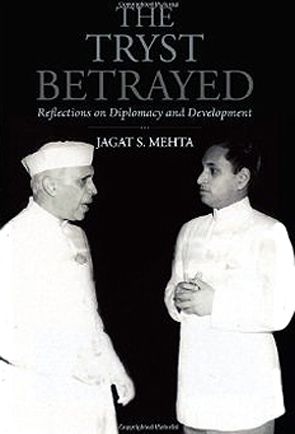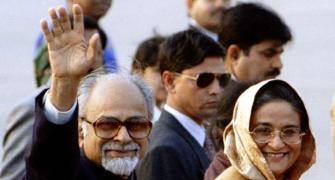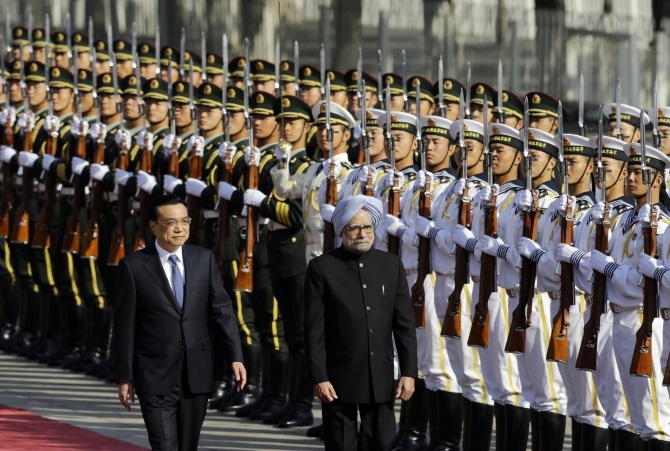 'His negotiations with Idi Amin and his men for compensation for the Indians, who left Uganda, were particularly tough. Apparently, Amin warned him that the body of the British negotiator, who came earlier, was found in a roadside gutter...'
'His negotiations with Idi Amin and his men for compensation for the Indians, who left Uganda, were particularly tough. Apparently, Amin warned him that the body of the British negotiator, who came earlier, was found in a roadside gutter...'
'As Jagat Mehta''s special assistant during the last two years of his tenure as foreign secretary, I saw for myself how his conviction, courage and patriotism enabled him to fight against heavy odds,' says Ambassador T P Sreenivasan.
Former Foreign Secretary Jagat Singh Mehta, 92, who breathed his last this week in Udaipur, had a meteoric rise in the Foreign Service because of his intellectual prowess and strategic thinking. But he proved too much ahead of his times to complete his tenure at the helm of the service.
'Much maligned', 'much misunderstood' and 'more sinned against than sinning' are some apt descriptions of Jagat Mehta.
For a diplomat and statesman, who made an immense contribution to foreign policy right from the time of Pandit Nehru in 1947 to Charan Singh in 1979 in various capacities in the service and later as a thinker and writer, the entry on him in Wikipedia is a meagre paragraph, which does no justice to his illustrious career.
He is described as an Indian 'politician and diplomat' who was Foreign Secretary from 1976 to 1979. His postings to China as charge d'affaires (1963 to 1966) and Tanzania as high commissioner (1970 to 1974), his books and Padma Bhushan award (2002) are mentioned.
"I am not an exportable commodity," Jagat Mehta used to quip when asked about his only ambassadorial assignment to Tanzania. The fact is that he had made himself indispensable in the ministry as a foreign policy thinker and negotiator.
He used to recall how he was the only under secretary in the ministry of external affairs, reported to Pandit Nehru and stayed in the same house he occupied later as the foreign secretary.
He turned his innocuous posting to Tanzania into a major listening post in Africa and won the hearts of the Africans and the Indians in East Africa. Policy makers should reread one of his dispatches on the creeping Chinese influence in Africa to understand Chinese methods today.
It seems the Tanzanians realised the size of the Chinese hordes, which had arrived only when they saw the quantity of noodles being imported into the country.
Jagat Mehta returned to the ministry as joint secretary and was soon appointed by Indira Gandhi as foreign secretary, overlooking the claims of some of his seniors. He was considered Indira's blue-eyed boy during her term, even through the first nuclear tests, the emergency and her defeat in the elections in 1977.
The change of government gave Mehta an opportunity to shape the Janata Party's foreign policy through 'genuine nonalignment'. Morarji Desai and Atal Bihari Vajpayee were inclined to accept his suggestions to improve relations with the US, China and Pakistan, while maintaining good relations with the Soviet Union.
He also recommended some changes in nuances of our nuclear policy by entering into a dialogue with the US. The initiatives such as Morarji Desai's visit to the US and Vajpayee's visit to China were results of his prodding the Janata government to bring in subtle changes in foreign policy.
These initiatives, meticulously analysed and formulated for the political leadership, turned out to be too much ahead of the times and, therefore, did not make much headway and eventually led to Jagat Mehta's downfall.
The country was in too cozy an embrace with the Soviet Union to think in terms of diversifying its relations and the Janata government was particularly suspect on this matter.
The US initiative and signals of change in nuclear policy ended in a fiasco when President Carter cut short his visit and returned after a disastrous conversation with Morarji Desai.
Vajpayee's China visit turned sour when China invaded Vietnam even when he was on Chinese soil. Many in the Congress party and the Soviet lobby sharpened their attack on Janata foreign policy and focused on Jagat Mehta as its architect.
India's decision not to recognise the Vietnam backed Kampuchea provoked the Soviet Union itself. Eventually, it was the Charan Singh government, which decided to appoint another foreign secretary even when Jagat Mehta had several months to go before his retirement.
Prime Minister Charan Singh explained that the change was necessary because Mehta had brought in changes in the US, China and Pakistan policies against the interests of the country.
A posting abroad was offered to him, but Indira Gandhi withdrew even that when she returned to power in 1980. But Mehta stayed on with the government till his retirement, doing various diplomatic errands.
As Jagat Mehta's special assistant during the last two years of his tenure as foreign secretary, I saw for myself how his conviction, courage and patriotism enabled him to fight against heavy odds.
A particularly painful experience for this veteran diplomat was the accusation that he had hurt India's prestige at the Lusaka Commonwealth Heads of Government Meeting, CHOGM, by promoting his own candidature as the secretary general of the Commonwealth.
I know for certain that it was the inept handling of the issue at the political level that led to the fiasco. Mehta took the moral responsibility on himself and submitted his resignation, but instead of letting him leave, he was kept on and later dismissed, partly on account of the Lusaka incident.
The government did not even inform him of the impending change till a few days before the new foreign secretary arrived to take over. None of these discourtesies provoked him and he countered my advice to react by asserting that he was a disciplined soldier.
Honest and upright, he met allegations and accusations in good humour, considering himself above suspicion.
Jagat Mehta was a perfectionist and kept revising his notes and speeches incessantly. In the pre-computer age, this meant typing and retyping papers by an army of stenographers, which I kept correcting before submission to him.
I remember counting more than fifty versions of the toast that Vajpayee was supposed to deliver in Beijing. The joke about him was that when someone went to him and said that he should look at a speech that was to be delivered that day, he said, "What do you mean? I need to finish yesterday's speech first!"
Jagat Mehta has recounted a number of the tough negotiations he was involved in, particularly with the Chinese on many issues, including the border. He had the habit of recording the minute details of these negotiations, just as he recorded the reasons for each of his decisions on every file.
His negotiations with Idi Amin and his men for compensation for the Indians, who left Uganda, were particularly tough. Apparently, Amin warned him that the body of the British negotiator, who came earlier, was found in a roadside gutter.
But Mehta managed to leave Uganda in one piece after getting a sizeable compensation by negotiating each case separately. I saw how he handled Soviet diplomats during Morarji Desai's visit to Moscow when it became difficult to find a compromise on a reference to the Indo-Soviet Treaty in the Joint Statement.
It is to Jagat Mehta's credit that he was fully vindicated, when India pursued subsequently the same policies he had advocated towards the US, China and Pakistan. He had even anticipated the understanding we reached with the Americans on nuclear issues in 2005 by signaling that we would be flexible on non-proliferation.
Vajpayee, as prime minister, made amends for the injustice done to him by seeking his advice and conferring the Padma Bhushan on him.
Apart from his policy frustrations, it pained Jagat Mehta that many of his colleagues in the foreign service were extremely critical of some of his administrative decisions, even though they were taken in the best interest of the service.
His exhortation to women officers to accept difficult postings caused a virtual revolt and resulted even in a court case. When he sought to expand the IFS, ulterior motives were attributed to him.
If only he was allowed to expand the service at that time, we would not have faced the acute shortage of officers in later years. None of these caused any rancor in him as his mind was constantly focused on India and its future.
What he lamented in one of his last books was not his personal frustrations, but The Tryst Betrayed.
Jagat Mehta's lasting legacy will be his intellectual contribution to the making of foreign policy and his humanism as exemplified in his social work in Rajasthan in the evening of his life.
Buy Jagat Mehta's The Tryst Betrayed at Rediff Shopping!
For earlier columns by Ambassador T P Sreenivasan, please click here.







